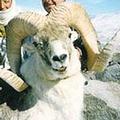 「盤羊」(Arkhar,或稱Argali)為一生活在塔吉克斯坦山區的巨型羊類,近年已越趨罕見。為期兩年的盤羊禁捕令,更激怒了在巴達赫尚省(Badakhshan)這群塔吉克斯坦偏遠地區的獵人。
「盤羊」(Arkhar,或稱Argali)為一生活在塔吉克斯坦山區的巨型羊類,近年已越趨罕見。為期兩年的盤羊禁捕令,更激怒了在巴達赫尚省(Badakhshan)這群塔吉克斯坦偏遠地區的獵人。
持反對意見的人,其中包括一名在目加伯(Murghab)不願具名的獵人表示,塔國政府在1月1日起實施的禁捕令,將會使更多的盤羊遭到獵殺,而非減少。
該名獵人提到:「看看南非繁榮的情景,因為當地開放觀光客狩獵。他們沒有禁捕令,且『狩獵』公司會繁殖並保育這些動物,使其有紀念品的價值。」
另一種名為馬可波羅羊(Marco Polo sheep)的盤羊亞種(學名Ovis ammon polli),是因威尼斯探險家馬可波羅於公元1271年橫跨阿富汗時,對該物種進行描述而得其名。
盤羊是綿羊中的巨人。體重最高達200公斤,並擁有彎曲的角,長度可達2公尺。想要獲得世界上最大羊類作為紀念品遊憩獵人,願意支付高額的款項以取得這類的戰利品。在海拔12,000到13,500英呎狩獵紮營的花費支出,增加了觀光業與探險隊的收益,為當地居民提供重要的資金來源。
環境專家拉提費(Alikhon Latifi)表示,塔國的狩獵公司透過投資、創造就業機會與發展永續觀光,為當地的經濟發展貢獻良多。「這項禁令考慮不周,也不合理,進而會迫使這些公司出走。」假若合法的公司離開,拉提費表示:「他們的位置將會被盜獵者取代。」
「第二,任何擁有槍枝的人將會肆無忌憚的射殺盤羊。」拉提費接著提到:「巴達赫尚當地留有許多武器是眾所皆知的事,在『1992-97公民戰爭』中遺留下來的武器並未完全繳回,我相信在近幾年將會失去為數可觀的盤羊。」
非政府組織「自然保育志願者團體」(Nature Protection Volunteers)成員Firuza Abdurahimova則反對為取得紀念品而狩獵。Abdurahimova表示:「由於盤羊列入國際瀕危物種的名單,在精確估計塔國境內羊隻的數量與可用的配額之前,應禁止獵捕行為。」
盤羊在世界自然保育聯盟《瀕危物種紅皮書》(IUCN Red List of Threatened Species)中被列為「易危」(Vulnerable to extinction)的等級,因為一般相信該物種數量已大幅減少。
盤羊同時也列入《華盛頓公約》(Convention on International Trade in Endangered Species, CITES)附錄二(Appendix II)中,列名的物種雖然當前沒有滅絕的危險,但除非交易受到嚴格的控管,否則依然有滅絕的可能。另外,必須擁有《華盛頓公約》的許可證明文件才能交易名單上的物種,或其它部分的組織。
「歐洲自由電台」(Radio Free Europe)一月份報導中指出,據塔國官方資料顯示大約有12000隻的馬可波羅羊在巴達赫尚。「野生動物保育協會」(Wildlife Conservation Society)的美國動物學家George Schaller,在2008年進行的盤羊族群數量普查結果,仍無法為塔國提供一個可靠的盤羊數量估計值。
這項調查在帕米爾高原(Pamir Mountains)進行,該處是興都庫什(Hindu Kush)、喀喇崑崙山(Karakoram)與崑崙山(Kunlun)三座山的交界地,調查試圖估算馬可波羅羊在四個國家內的數量,包括阿富汗、中國、巴基斯坦與塔吉克斯坦。
Schller寫道:「為了取得肉品而狩獵令馬可波羅羊的族群數量銳減,這種情況其他三個國家境內皆然,除了在中國因有較好的保育措施,族群有增加的趨勢。由於盤羊可以輕易地跨越國界,如果要讓盤羊受到適當的保護與管理,就必須進行跨國境合作,由四國共同籌劃的「帕米爾和平公園」(Pamir Peace Park)正進行密集的討論。」
A two-year moratorium on hunting the arkhar, or argali, an increasingly rare species of giant wild sheep found in the mountains of Tajikistan, has angered hunters in the remote Tajik region of Badakhshan.
Imposed January 1 by the Tajik government, the ban will result in the killing of more, not fewer, arkhar, say critics, including a hunter in Murghab who did not want to be named.
"Look at South Africa, it flourishes because of hunting tourism," he said. "They don't have a ban, and [hunting] companies breed animals as well as conserving them, so they have a value as trophies."
Also called Marco Polo sheep, Ovis ammon polii, the species takes this name from Venetian explorer Marco Polo who described the animals during his crossing of Afghanistan in 1271.
The arkhar is a giant among sheep. The largest animals weigh in at 200 kilograms, with curving horns that can extend for two meters.
Sport hunters who want trophies of the world's largest sheep are willing to pay a high price for such a trophy. Revenue is raised on tourism and expedition costs to hunting camps located at 12,000 to 13,500 feet, helping local peoples by providing an important source of currency.
Environmental expert Alikhon Latifi says hunting firms in Tajikistan contribute a lot to the local economy through investment and job creation and are developing sustainable tourism.
"This ill-thought-out, unjustified hunting ban could prompt these firms to leave," he said, adding that if the legitimate companies go, "their place will be filled by poachers."
"Secondly, anyone who has a firearm will start shooting arkhar without any controls," Latifi continued. "It's no secret that there are a lot of weapons in Badakhshan. Not all the arms left over from the [1992-97 civil] war have been seized yet. I believe we'll lose significant numbers of arkhar in a matter of years."
But Firuza Abdurahimova of the Nature Protection Volunteers, a nongovernmental organization, is against trophy hunting.
She says that "because the arkhar is listed as an endangered species internationally, there should be no killing at least until an accurate estimate is made of the number of animals living in Tajikistan and a quota can be established."
The species is listed as Vulnerable to extinction by the IUCN Red List of Threatened Species because it is believed to be in significant decline.
Argali is also on Appendix II of the Convention on International Trade in Endangered Species, which lists species that may not now threatened with extinction but that may become so unless trade is closely controlled. CITES permits are required for trade in this species or its parts.
According to Tajik official data, there are some 12,000 Marco Polo sheep in Badakhshan, Radio Free Europe reported in January.
An argali census in 2008 by U.S. zoologist George Schaller of the Wildlife Conservation Society was unable to determine a reliable population estimate for Tajikistan.
The census, conducted in the Pamir Mountains, where the Hindu Kush, Karakoram, and Kunlun ranges meet, attempted to estimate numbers of Marco Polo sheep in four range states - Afghanistan, China, Pakistan and Tajikistan.
Schaller wrote, "Hunting for meat has decimated the Marco Polo sheep populations in all four countries but with better protection they appear to be on the increase in China. Transboundary cooperation is essential if the species is to be adequately protected and managed as argali readily cross international borders, and a four-country Pamir Peace Park has been proposed and is under discussion."
※Institute for War and Peace Reporting contributed to this report.






